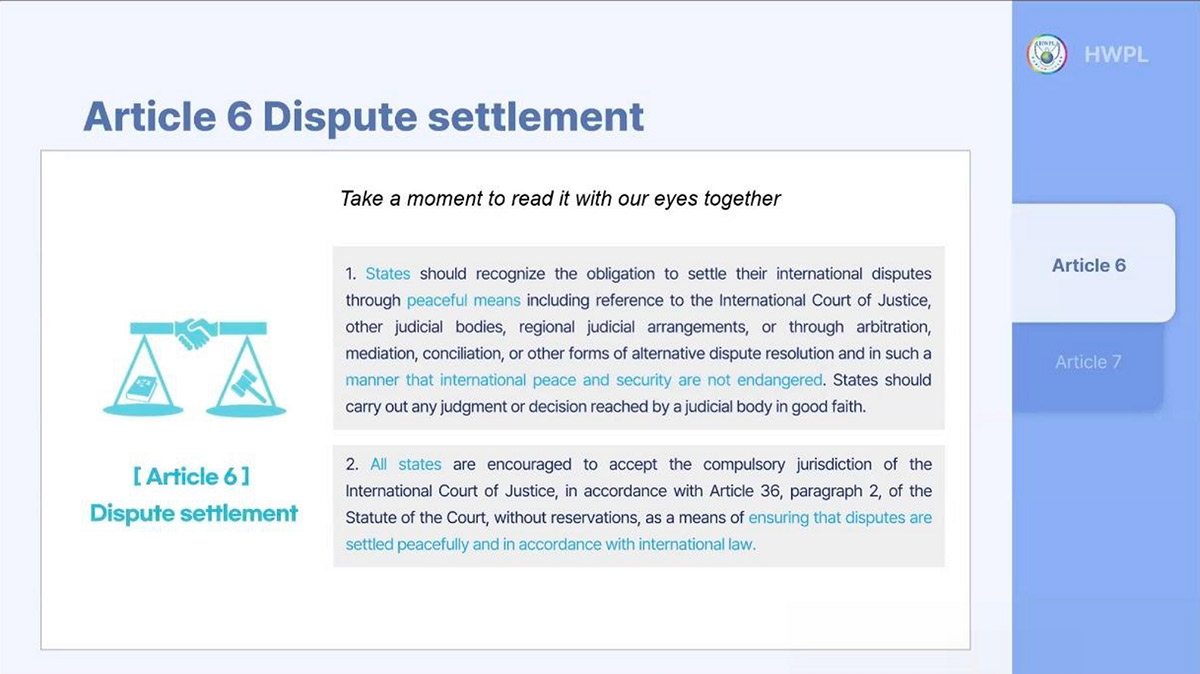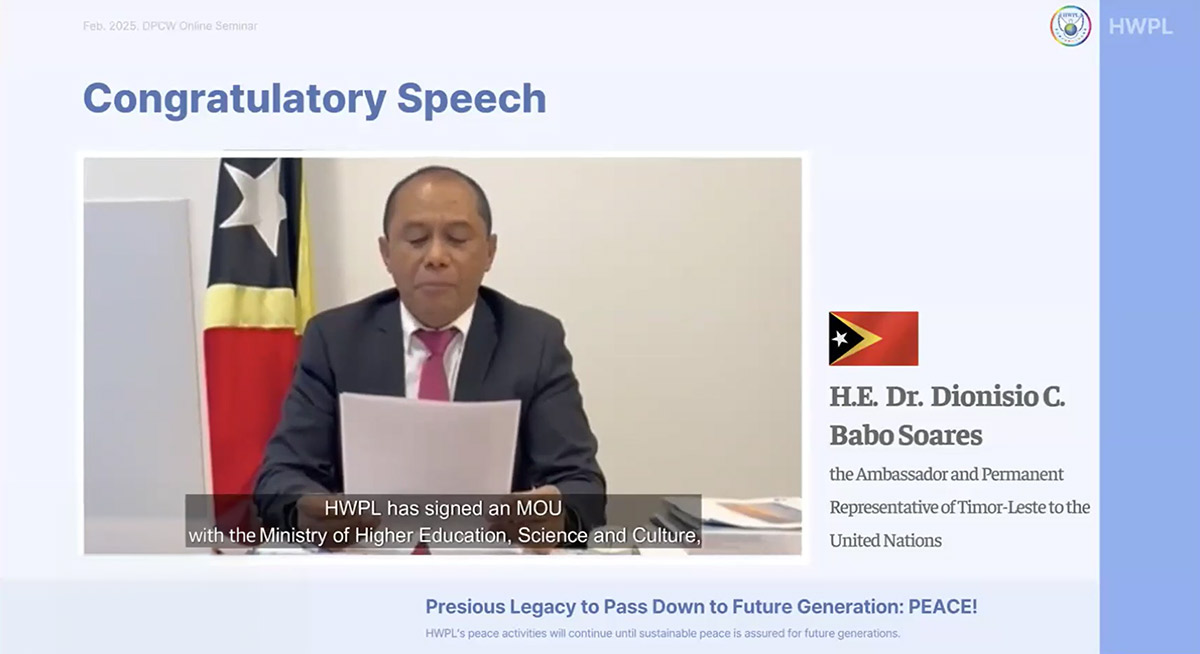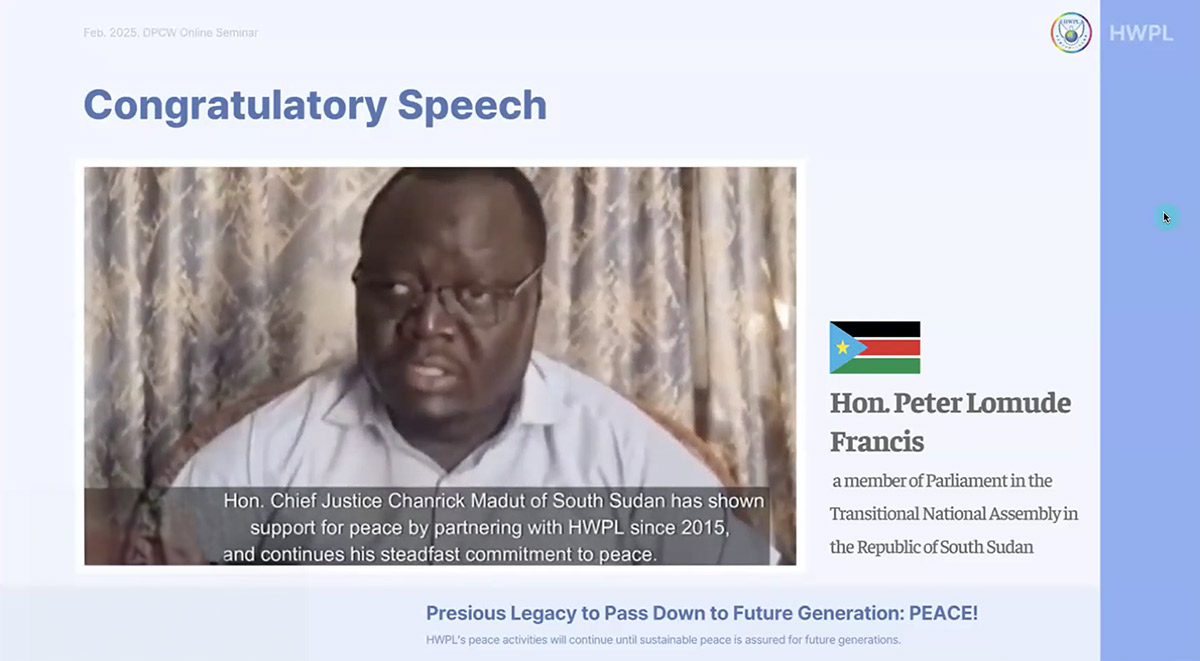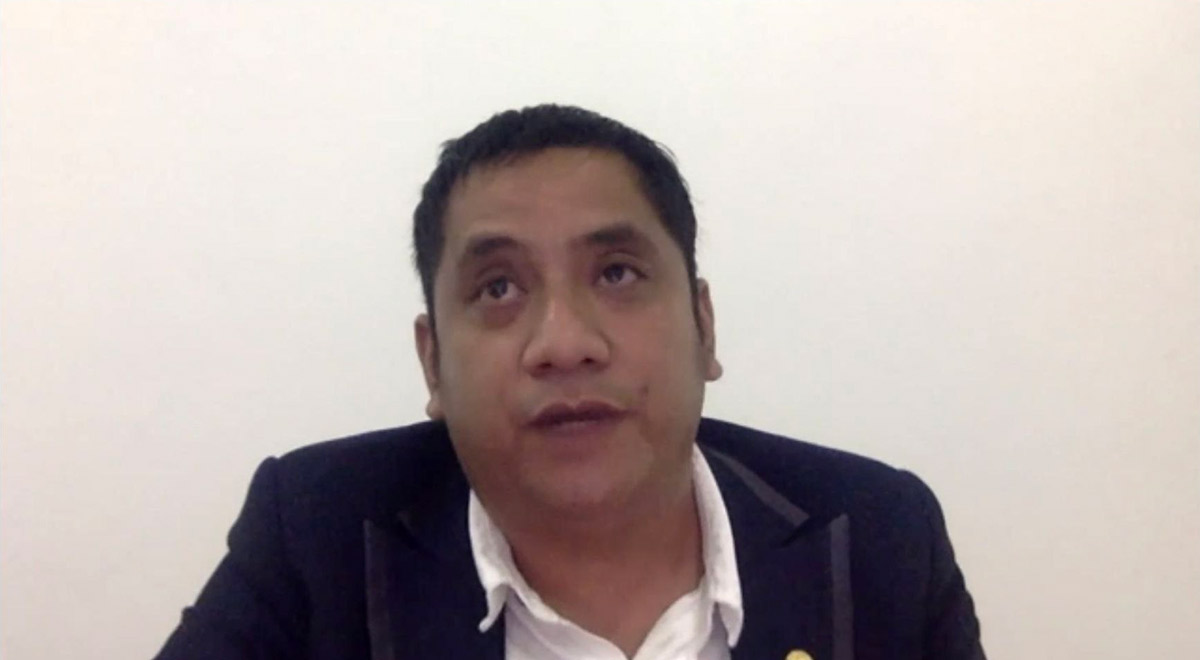DPCW Online Seminar
How to Achieve Peace: The Answer is in the DPCW

▲ Explanation of the Detailed Provisions of the DPCW
On February 22, 2025, HWPL hosted an online seminar titled “How to Achieve Peace? The Answer is in DPCW,” aimed at promoting the contents of the “Declaration of Peace and Cessation of War” (DPCW), sharing its vision and feasibility, and providing a platform for peace activists to engage in meaningful discussions.
Around 70 peace activists, including high-ranking government officials, legal experts, educators, and journalists from 13 countries, attended the event to share their perspectives and discuss ways to achieve peace. Notable participants included the Ambassador and Permanent Representative of Timor-Leste to the United Nations, the Secretary of State for Art and Culture of Timor-Leste, the President of Committee G of the Parliament of Timor-Leste, and a Member of Parliament from South Sudan.
HWPL announced the “Declaration of Peace and Cessation of War (DPCW)” on March 14, 2016, in collaboration with international law experts from 15 countries. The purpose of the DPCW is to end wars and establish sustainable peace. Comprising 10 articles and 38 clauses, the DPCW emphasizes core values such as “conflict prevention,” “conflict resolution,” and “maintaining sustainable peace.” HWPL has been actively working toward having this declaration adopted as a UN resolution.
The seminar began with an introduction to HWPL, followed by congratulatory speeches from the UN Ambassador of Timor-Leste and a Member of Parliament from South Sudan.

▲ Congratulatory speech – H.E. Dionísio Babo Soares, Ambassador of Timor-Leste to the United
H.E. Dionísio Babo Soares, the Ambassador of Timor-Leste to the United Nations, stated:
“Timor-Leste has also experienced the pain of conflict and has fought fiercely and earnestly to achieve peace. Now, we have overcome conflict, and we hope that our history serves as an inspiration for other nations still suffering from turmoil. Remarkably, we can discover the core values of the DPCW in the history of Timor-Leste. Timor-Leste held a national referendum, sharing the same spirit of ‘peaceful conflict resolution’ as the DPCW (Declaration of Peace and Cessation of War) in its pursuit of independence. Similar to the disarmament clause, a weapons collection program was implemented immediately after independence to ensure stability. Moreover, the government and civil society are promoting a culture that cherishes peace.”

▲ Congratulatory speech – Hon. Peter Lomude Francis, Member of Parliament from South Sudan
Hon. Peter Lomude Francis, a Member of Parliament from South Sudan, stated:
“On May 15, 2024, His Excellency President Salva Kiir Mayardit of South Sudan made a historic decision by signing a national declaration officially endorsing the DPCW. This significant announcement was broadcast to the nation through South Sudan’s public broadcaster, SSBC, and has influenced other political leaders to follow suit in the peacebuilding process. As of now, 11 high-ranking government officials, including the Speaker of the National Assembly and the Chief Justice, have signed the declaration, reaffirming their commitment to global peace and the cessation of war. Notably, Chief Justice Chanrick Madut has been actively engaged in peace efforts in collaboration with HWPL since 2015 and continues his steadfast dedication to this cause.”
The seminar was conducted in two sessions. The first session introduced HWPL and the DPCW, explaining Articles 1 to 7 and highlighting how each article contributes to peacebuilding.

▲ Intervention – H.E. Jorge Soares Cristovão, Secretary of the State for Art and Culture of Timor-Leste
The second session focused on Articles 8 to 10 of the DPCW, followed by a presentation on the case of Timor-Leste. The seminar explored the historical experiences of Timor-Leste and their relationship with the DPCW. HWPL emphasized that each article should serve as a practical guideline for achieving peace, providing a detailed explanation of their meaning and applicability.
Notably, the seminar highlighted the similarities between Timor-Leste’s peace process and the principles outlined in the DPCW, offering concrete insights into the feasibility of implementing the DPCW. Additionally, H.E. Jorge Soares Cristovão, the Secretary of the State for Art and Culture of Timor-Leste, shared insights into the country’s journey towards peace and reconciliation.
In the final segment, participants shared their thoughts and discussed ways to collaborate for the realization of the DPCW. A lawyer from Myanmar expressed:
“War and conflict continue to plague the world, especially in Myanmar, which stands at a crossroads between war and peace. This situation threatens regional stability in Southeast Asia, making it crucial to find practical solutions for sustainable peace. The DPCW promotes peaceful coexistence among nations, fosters friendly relations and cooperation, and encourages dialogue to resolve disputes. In conflict zones, countless lives are lost, people are displaced, and crises like food insecurity, disease, and natural disasters worsen. To prevent these tragedies, we must unite as advocates and messengers of peace. Article 10 of the DPCW emphasizes spreading a culture of peace—an urgent necessity for Myanmar. By applying its principles, we can work toward sustainable peace and address the root causes and consequences of conflict.”
The seminar confirmed that the DPCW is not just a declaration but a practical guide for conflict resolution and peacebuilding. HWPL plans to continue strengthening cooperation with governments and civil society worldwide with the goal of having the DPCW adopted as a UN resolution.













